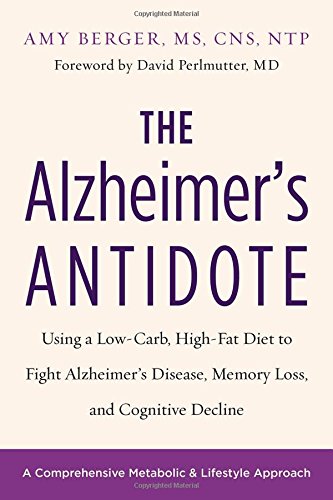Once you understand how excess carbohydrates can negatively affect your body (1, 2, 3), it’s easy to see how they can wreck your brain. Yet, conventional wisdom continues to tell us obesity and diabetes are controllable, while Alzheimer’s and dementia are just ‘bad luck’??
Sure, there’s some genetic susceptibility (ApoE4), but this does NOT mean it’s an excuse to mail-it-in. Especially when we know that the same nutrition and lifestyle practices that prevent lower-risk individuals from experiencing cognitive decline, can help those unlucky enough to draw the gene card…and sometimes even more so.
“The ApoE4 gene does not cause Alzheimer’s Disease. What it does is make a person more susceptible to the metabolic damage inflicted by the modern Western diet and lifestyle.”
That quote you just read was from a book called The Alzheimer’s Antidote, by Amy Berger (that I highly recommend).
In it, she entertainingly explains how Alzheimer’s and diabetes are simply a different outcome to the same problem – metabolic derangement. Since, in both cases, we have an abundant amount of available fuel (glucose), with cells that end up starving and dying because they can’t access it – predominantly because of a reduction in carbohydrate tolerance, but also because of chronically elevated insulin.
Aside from the fact that insulin resistance, obesity and diabetes are highly correlated with cognitive decline, we know metabolic dysfunction is a factor because Alzheimer’s patients have a significant reduction (45%+) in the rate at which the brain uses glucose – also known as the CRglu (cerebral metabolic rate of glucose). Moreover, we know that individuals with Alzheimer’s have a build-up of beta-amyloid plaque (1, 2), that form as a result of chronically elevated insulin (since the insulin-degrading enzyme that’s supposed to clear the brain of beta-amyloid is forced to prioritize insulin removal first).
Therefore, the same diet and lifestyle factors that chronically elevate insulin and blood glucose and raise our risk of obesity and diabetes, are increasing dementia and cognitive decline. So, to say one is preventable while the other is a ‘natural consequence of aging,’ or that one is behavior related while the other is simply ‘unlucky,’ is just plain ridiculous.
(…and that’s before getting into the general prescription of ‘stimulating a lazy brain‘ with crossword puzzles!)

For those that have been following this blog for some time, the insulin resistance/cognitive decline connection should be nothing new. As we’ve talked about the relationship between the increased risk of Alzheimer’s for those with diabetes, and how essentially it’s Type 3 Diabetes.
But a very important distinction, that Amy explains in her book, is that you don’t need 1 to get the other:
“Many type 2 diabetics will never go on to develop AD, and many AD patients are not diagnosed diabetics. The relationship between the two is more like that of physiological cousins. That is, they result from the same underlying metabolic imbalances, but manifest differently depending on which part of the body are affected.”
Meaning, the typical markers of metabolic dysfunction (obesity, elevated triglycerides, high blood sugar, hyperinsulinemia, elevated A1C) can go unnoticed. Leaving many otherwise healthy looking individuals experiencing a gradual decline in cognitive function long before (20-30yrs old) there’s any noticeable warning signs.
A frightening realization, but a necessary one…and just like diabetes, heart disease, and obesity, a PREVENTABLE one!
As laid out in The Alzheimer’s Antidote, there are certain nutrition, training, and lifestyle practices that can effectively treat, prevent, and even reverse the metabolic dysfunction associated with cognitive decline. And in addition to sharing this information in great detail, providing extremely practical food lists, and curtailing the advice so it’s easy for everyone to digest, Amy’s book helps you further understand the impact of statins, the problem with the low-fat and low-cholesterol recommendations, and the benefits of fasting, ketosis, exercise, and sleep.
Realistically, no one should be living with Alzheimer’s. And as you’ll discover, there’s PLENTY you can do to avoid it.
Stay Lean!
Coach Mike
RELATED ARTICLES:
The Best Thing You Can Do For Your Brain

